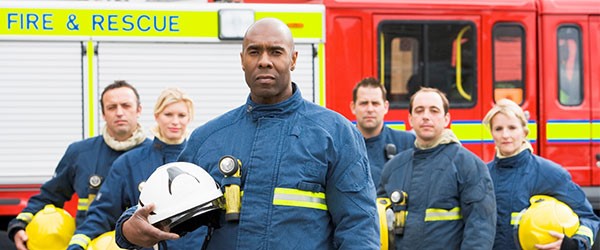 As someone whose career has involved leading firefighters into some of the most dangerous situations, Andy Roe has thought-provoking observations about leadership. Anne-Marie Duguid and Alex Galvin of SSAT write
As someone whose career has involved leading firefighters into some of the most dangerous situations, Andy Roe has thought-provoking observations about leadership. Anne-Marie Duguid and Alex Galvin of SSAT write
On Monday 9 October, SSAT held the annual Leading Edge conference. The theme this year was ‘how do strong schools stay strong?’
The SSAT Leading Edge network represents the highest performing schools in the country, supporting them to collaborate, innovate and contribute to the wider system.
The opening keynote set the scene and was the most inspiring story of leadership that many of us have heard. Andy Roe, assistant commissioner of the London Fire Brigade, talked about leadership and building effective teams. He has extraordinary experience of leading teams, under the kind of pressure most of us couldn’t begin to imagine. He has led teams in dealing with many high-profile incidents in London in recent years, and before that faced highly pressurised situations as a captain in the British army.
Anyone listening to Andy Roes speak would be left in no doubt that he is a charismatic and inspiring leader. Given his experiences and the context in which he leads, Andy is perhaps what you might imagine to be the embodiment of a heroic leader. After all, he leads people in the most challenging of circumstances; he and his teams face personal danger as a matter of course. He needs to inspire his teams not only to follow him, but to follow him into burning buildings.
It’s not about bravery and working under pressure
However, what came next in his presentation told a different, yet more powerful story about effective leadership. Having been hearing about the extreme situations in which he and his team have operated we might have expected him to talk about bravery, managing under pressure and effective systems. Instead, he said that he believes the most effective leaders are kind, open, reflective and clear. He talked about the importance of letting your team know that you have their best interests at heart, of forgiving people when things don’t go to plan and of open and honest communication. He talked about the importance of knowing people and knowing yourself.
The most effective leaders are kind, open, reflective and clear
Andy Roe, Assistant Commissioner, London Fire Brigade
He reminded us of the moral purpose of leadership, and that great teams begin and end with great leaders. He also reminded us that teams are all about people – people with different skills and experiences, different needs and personal qualities.
Value differences
We need to value difference, be inclusive in our thinking and resilient but not stoical. When you are striving for excellence, you are asking a lot of people, you will be putting people under pressure and you need to be kind. Teams need to have a sense of common purpose; individuals need to feel recognised and valued.
Lastly, Andy Roe talked powerfully about the importance of creating an environment in which people feel able to admit fragility, to ask for and receive help. He talked about the intense psychological pressure many of his teams work under and how in recent times the culture at the London Fire Brigade has been transformed, making it ok to admit when you are struggling. Creating an emotionally healthy environment requires leaders to admit their weaknesses too – and to act as positive role models in terms of self-reflection and seeking help when needed.
Creating an emotionally healthy environment requires leaders to admit their weaknesses too
Uniting behind shared values
Reflecting afterwards on his words, we thought that truly heroic leadership is often less about the bravery and abilities of one person than about the kind of leadership that enables everyone to work to the best of their abilities for the common good.
Considerate, collaborative leadership unites people behind shared beliefs and values, and enables each individual to fully contribute. Great leaders are more focused on how best to achieve their goals, and on the needs of others, than on self-aggrandisement. It is when teams are inspired and empowered that they can do truly extraordinary things.
As basketball star Michael Jordan said: ‘Talent wins games, but teamwork and intelligence win championships.’
Find out more about Leading Edge
